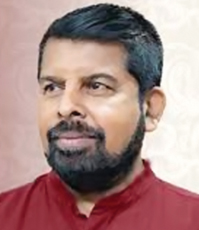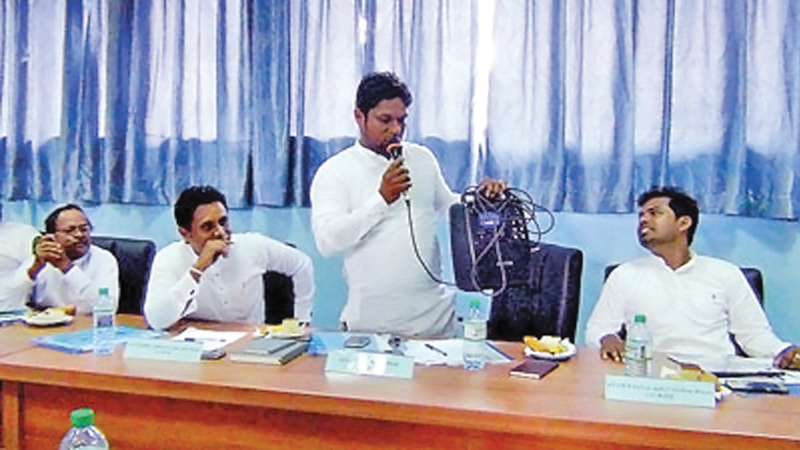 More than two months after Sri Lanka held its long-overdue Local Government elections, 50 local authorities remain without functioning administrations — effectively paralysing grassroots public services and exposing critical flaws in the country’s electoral and governance frameworks.
More than two months after Sri Lanka held its long-overdue Local Government elections, 50 local authorities remain without functioning administrations — effectively paralysing grassroots public services and exposing critical flaws in the country’s electoral and governance frameworks.
Most of the Councils affected are Pradeshiya Sabhas, with a handful of Urban Councils also caught in limbo. Public Administration, Provincial Councils and Local Government Minister Dr. Chandana Abayarathna said yesterday that the primary reasons for the deadlock include quorum failures, delays in gazetting members, unresolved women’s quota appointments, court injunctions, and inter-party rivalries.
The Minister pointed to deliberate absenteeism by Council members in several areas. “In many cases, members are choosing not to participate, and that has blocked the Councils from forming. At least 50 percent of elected or appointed members must be present to convene a meeting,” he said.
Adding to the deadlock are administrative delays in gazetting the names of elected and nominated Councillors. Without the official Gazette notification, even members willing to serve cannot legally take their seats.

Public Administration,
Provincial Councils and
Local Government Minister
Dr. Chandana Abayarathna
Legal barriers have also played a significant role. In the Wanathawilluwa Pradeshiya Sabha, an interim court order over the appointment of women Councillors has halted the formation of the council entirely.
Dr. Abayarathna said that some Councils, such as Anamaduwa and Seethawaka Pradeshiya Sabhas, remain hung after members walked out of sessions, leaving them without elected leadership. In Weligama, the situation took a darker turn when unidentified gunmen opened fire on the residence of a National People’s Power (NPP) member — one of the Councillors is expected to play a key role in Council formation. The Pelmadulla Pradeshiya Sabha is also facing internal disruptions, Ministry sources said.
The growing crisis has triggered discussions at the highest levels of Government. The Attorney General’s opinion has been sought on whether the administration of non-functioning Councils could be handed over to Provincial Local Government Commissioners, until a formal structure can be set up.
With 50 Councils still stalled and only 289 having successfully formed, the deadlock casts a long shadow over Sri Lanka’s commitment to democratic local governance — and its ability to ensure political stability at the grassroots level.
Commissioners to step in
With local authorities unable to carry out their mandated duties, the Government has made plans to place them under the temporary control of Provincial Local Government Commissioners (PLGCs).
“As a Government, we cannot allow any Local Government institution to collapse,” Minister Abayaratha said adding, “If the members continue to delay, the Provincial Local Government Commissioners will be assigned to administer them.”
The Minister also said that the Attorney General’s opinion has been sought to determine how best to proceed in cases of persistent deadlock.
In parallel, the Provincial Governors have been instructed to compile reports on non-functioning Councils and their members. Based on those reports, the Governors may use their powers to remove Councillors obstructing the formation of Councils and hand over administration to officials.
Some Councils finally formed
Despite the challenges, progress has been made in several Councils. Councils such as Matugama (SJB), Nagoda (SLPP), Walapane (NPP), and Delft (ITAK) were successfully constituted by late June. More recently, the Welikanda, Madawachchiya, and Horowpathana Pradeshiya Sabhas, as well as Beruwala Urban Council, were also set up.
However, political friction continues. The Opposition, Samagi Jana Balawegaya (SJB) suspended six of its members elected to the Beruwala UC after they reportedly voted for a National People’s Power (NPP) Councillor — an incident that reflects the broader pattern of party defections and alleged vote trading.
Secret ballot debate
A fresh round of controversy emerged when the Court of Appeal dismissed a petition seeking to prevent Western Province Local Government Commissioner Sarangika Jayasundara from holding a secret ballot for the Chairperson and deputy positions of the Seethawaka Pradeshiya Sabha.
The Court upheld the current legal framework, which grants Commissioners discretion to conduct elections in hung Councils. The ruling was welcomed by the NPP, which has been advocating for faster Council formations.
However, the case has reignited a public and legal debate over the use of secret ballots in Local Government. Critics said that permitting State officials such discretion opens the door to political manipulation and corruption, especially in a system where public employees may be vulnerable to Government pressure or inducements.
Calls for reform
Civic groups and legal experts are now urging electoral reforms to mandate open voting methods — such as roll-call votes or show of hands — when electing Council leaders. They contend that voters deserve to know how their elected representatives vote, particularly in light of serious allegations of bribery and betrayal.
“Secret ballots only help those looking to hide corruption,” said one civil society advocate. “There is no room for secrecy in local democracy.”
The mixed-member proportional representation system used in the election on May 6 produced no clear majority in almost half of Sri Lanka’s 339 Councils. While 289 local bodies have since begun operations, the remaining 50 are still without leadership.
Among the districts most affected are Kalutara (Western Province), Puttalam and Kurunegala (North Western Province), Kegalle and Ratnapura (Sabaragamuwa), and Matara (Southern Province).
Despite the challenges, Minister Abeyratne remains hopeful. “We expect these Councils to be set up soon — for the benefit of the people,” he said.
But with political deal-making, legal uncertainty, and growing public frustration, the credibility of local democracy may hang in the balance.
Public services stalled
The absence of elected leadership has created an administrative vacuum at the local level. Garbage collection, road maintenance, and other essential services that fall under the purview of local authorities are either delayed or irregular in affected areas.
“This is not a mere political impasse—it’s a direct disruption to the daily lives of people,” said a senior official in the Local Government Ministry. “Without a Mayor or Chairperson, Councils cannot approve Budgets or authorise development projects.”
While Local Government Commissioners and Secretaries have stepped in to handle day-to-day administration, their authority remains limited to routine matters, with no mandate for major decisions or policy oversight.
Legal loopholes and electoral design flaws
The current deadlock has highlighted inherent weaknesses in Sri Lanka’s electoral system. The mixed electoral method —designed to blend ward-level and proportional representation —has led to numerous hung Councils, with no single party or independent group securing an absolute majority.
Political analysts said that the failure to provide a tie-breaker mechanism or run-off provision within the existing legal framework has now resulted in confusion and stagnation.
“There was no plan for what happens when nobody wins outright,” said constitutional analyst Prof. Nirmal Ranjith Devasiri. “This was bound to happen under this model.”
Power struggles and delays
In the absence of clear legal remedies, political parties have begun backroom negotiations and coalition talks to form Council leaderships — often stalling appointments for weeks. Several instances of Councillors defecting from one party to another in pursuit of office have also been reported.
Meanwhile, women’s representation — a mandatory 25 percent under current law — remains incomplete in some Councils, further complicating the gazetting of valid Council compositions.
Court orders have also stalled the Council formation in a few districts, with recounts and legal petitions still pending.
Options
The Ministry of Public Administration has issued circulars empowering Provincial Governors to instruct Commissioners to appoint the leadership in hung Councils if no resolution is reached. In some Councils, such as Matugama, Nagoda and Delft, political consensus has been reached and leadership appointments made.
However, civil society groups have raised concerns about the potential for politicisation and lack of transparency in this process.
Looking ahead, electoral reforms may be necessary to prevent future deadlocks. Proposals under discussion include the introduction of tie-breaker ballots, run-offs, or alternative voting mechanisms, as well as clearer deadlines for council formation.
Voter frustration mounts
For voters, especially in rural areas, the failure to establish functional Councils has become a source of mounting frustration.
“We stood in queues for hours to vote, and nothing has changed,” said a resident in the yet-to-be-formed Uhana Pradeshiya Sabha. “There’s no Chairman, no development — only silence.”
The Election Commission has not ruled out recommending re-elections in persistently deadlocked Councils as a last resort, but such a decision could risk further delays, low turnout, and administrative cost.
For now, around 50 local authorities remain in limbo —politically leaderless and administratively constrained — while the public waits for their voices to translate into action.








